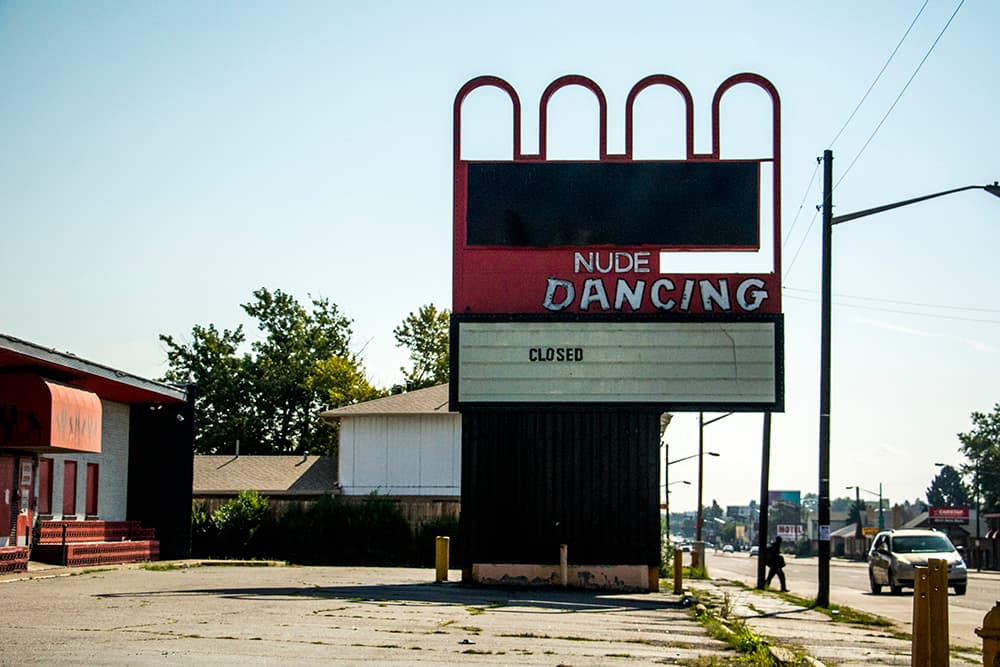
There are six words that are overwhelmingly likely to appear in pieces of journalism about Denver's Colfax Avenue: "The longest, wickedest street in America."
And then four words that usually follow: "according to Playboy Magazine."
I've seen this supposed Playboy quote used by quite a few local media institutions. The New York Times even noted in a feature article that Colfax is "often described as one of America's wickedest streets" -- but they never said by whom.
Wonder why America's newspaper of record hedged on this one? It may be because Playboy Magazine never actually printed those words. And if they did, the article has proved elusive to historians. We're not sure, but we've found some interesting results anyway.
Now, I know that it's a tempting quote. Hell, we used it in a story today. It's an easy euphemism for a lot of things that make people uncomfortable: drugs, sex, violence, illness, poverty. It bundles all that up with a moral judgement -- "wickedest" -- without an actual person having to say it.
It's also a point of pride, a piece of Colfax kitsch. The quote has infiltrated marketing materials, appearing with the "Playboy Magazine" citation on the websites of the Colfax Avenue Business Improvement District and of Visit Denver. There was also, of course, a "longest, wickedest" beer from a local brewery. (It's a witbier.)
Either way, it boils down to this: Playboy said it -- can't argue with the experts!

Well, friends, Playboy has an archive.
I paid my $8 and I scrutinized its pages -- for the articles, I swear -- and I've so far found nothing resembling that quote.
Playboy says its archive includes every page of every magazine they ever published, all scanned and searchable. I ran various searches of "Colfax," "wicked," "Denver" and "wickedest" and browsed dozens of articles.
I even enlisted the help of the Denver Public Library, since articles on their website variously attribute the quote to Playboy or Hugh Hefner himself.
"My researchers have thrown in the towel," library spokesman Chris Henning wrote to me after an extended team effort.
"The most they can come up with is that they 'feel comfortable saying the quote is frequently attributed to an article in Playboy, but that it's yet to be confirmed.'"
I've seen a couple places mention that the quote was printed in the 1970s. One long-time resident thinks it was associated with the filming of the 1978 Clint Eastwood film "Every Which Way But Loose," near Sid King's Crazy Horse. Another source things she saw a 1978 Playboy guide to Colorado that included the quote. If you have more information, tell me.
For now, the search has turned up not a trace -- but we did find some equally inspired musings about the avenue.
Most importantly, there was the 1977 article that began like this:
"A sign on Colfax Avenue: DENVER'S FINEST ALL-NUDE GIRLS FROM LAS VEGAS. Well, that's how it goes in Colorado. Even the nudity has to be imported," wrote D. Keith Mano, a Christian novelist who died last year.
"No one, you see, has ever been born in Colorado. Colorado or not Colorado is a choice people make when they come of age, at bar-mitzvah time. If America's puberty could be pin-pointed by longitude and latitude, it'd be right there ... Coloradans have seceded spiritually; they give off an athletic, high-altitude arrogance. Wiser than the rest of us, more passionate and compassionate, more self-certain. More natural, damn it. As if they were organic human beings and we, you and I, were so many Swanson TV dinners."
That was all on the first page. As Mano continues, in columns that thread between nudie ads: "The residency requirement is 32 days ... Then you can start bitching about all the immigrants."
It continues in ways that make me feel bad as both a writer and a resident of this state. Colorado as a whole is trying to "invent a Switzerland, isolationist and haughty." The "sheer cheesiness" of Colfax is "spectacular."
Denver is "Omaha with mountains," and he's not impressed by mountains, either. "They go on and on, up and down. The whole shtick is overdone; harped on, you might say."
Aspen, meanwhile, is "5,000 dentists skiing down one hill," with the exact same housing problems that it faces today.
I could go on. Point is: Forget Colfax Avenue. Playboy dragged the whole state.

So, what do we do now?
I kind of hope that there was a gap in the archive and maybe the legendary issue is out there somewhere. Even a recording of Hugh Hefner muttering it at a party would do. Or maybe someone else wants to come forward and claim credit.
Until then, the question of this "wicked" quote has informal historian Jonny Barber looking at the avenue -- and life itself -- in a new light.
"I was thinking about this last week, and then we had this conversation and it set off my whole weekend. Do we even know what’s real?" he asked my colleague, Erica Meltzer. He had even put the quote on his website, ColfaxAvenue.com.
"Do we have to rethink all this? Or do we not? Do we just keep the mythology alive and let it be? Let that be the myth."
P.S.
Playboy did once use the word "wickedest" in reference to Denver. "Denver's Holladay Street," according to a 1961 article was among the "wickedest and wildest enclaves in all the wild, wild West."
Today, Holladay Street is Market Street -- one of the ritziest stretches of property in Denver.
If you know something I don't, let me know.











